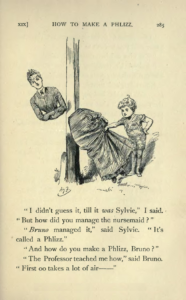The name Phlizz
What is Phlizz? Or: What is a Phlizz?
Phlizz is a factitious word introduced by Lewis Carroll, see, for instance, Lexico.com (https://www.lexico.com/en/definition/phlizz). It occurs a number of times in Sylvie and Bruno.
The first occurrence is in chapter vi (page 74/74 in the 1889 edition of):
Bruno .. picked a fruit …
“It hasn’t got no taste at all!” he complained. “I couldn’t feel nuffin in my mouf! It’s a – what’s that hard word, Sylvie?”
“It was a Phlizz,” Sylvie gravely replied.

Chapter xix even has the title How to make a Phlizz (p. 271) and here we find the following dialogue (p. 284/285):
“But w
hat became of the nursemaid?”
“It are gone!” Bruno solemnly replied.
“Then it wasn’t solid, like Sylvie and you?”
“No. Oo couldn’t touch it, oo know. If oo walked at it, oo’d go right froo!”
… “But how did you manage the nursemaid?”
“Bruno managed it,” said Sylvie. “It’s called a Phlizz.”
“And how do you make a Phlizz, Bruno?”
“The Professor teached me how,” said Bruno.
“First oo takes a lot of air –“.
And, finally, in chapter xx (p. 294):
“…. they will be sorry when they find them [sc. flowers] gone!”
“But how will they go?”
“Well. I don’t know how. But they will go. The nosegay was only a Phlizz, you know. Bruno made it up.”
Lewis Carroll did not present a definition of Phlizz , but based on the citations mentioned The Oxford English Dictionary has reconstructed the following meaning: “Something apparently existing, or existing in name, but having no real substance”. (The Oxford English Dictionary, 2nd edition. Clarendon Press Oxford, 1989)
The Oxford English Dictionary adds a derived meaning of the word: “hence allusively, anything without meaning or value, a mere name”. I am, however, under the impression that this derived meaning is suggested by later ocurrences of the word by others than Lewis Carroll.
The oldest use of Phlizz by others I could find is from 1899, in the Johnson Club Papers (“A selection of the papers read at the quarterly meetings of the Johnson Club”, p. 188). Actually, this is a reference to Carroll’s usage: “We crown the musicians with flowers that, like poor Bruno’s in the fairy tale, are but a phlizz.”
The British author John Galsworthy (1867 – 1933), however, presents an interpretation of his own. He uses the word Phlizz at least three times. Firstly, in Silver Spoon (Penguin, 1926): “What was the image of her but a phlizz, but a fraud?” (p. 187) and “Was Foggartism a phlizz?“ (p. 218).
We can find it also in Galsworthy’s Maid in Waiting (William Heinemann Ltd, 1931, p. 20): “The thing’s a phlizz. Just a low type of Homo Sapiens.”
The Dictionary of Slang and Unconventional English overlooks Carroll’s introduction of the word and only refers to Galsworthy, resulting in the following description: “a failure” en “a blend of flop + fizzle” (London: Routledge & Kegan Paul Ltd, 1937, reprint 1956). This clearly illustrates the shift in meaning by Galworthy’s use.
However, I would like to rely on the usage by the auctor intellectualis, Lewis Carroll himself. For me this evokes associations with the modern word virtual and its meaning of “existing in essence though not in actual fact”. In computer science virtual refers to a digital simulation of a physical environment, like in virtual reality.
So, here we are: the magazine Phlizz is a digital variant of a journal as it was thought of in the past, only existing in print. But, as we will see , it has a specific character of its own and it certainly has “meaning and value”.
So Phlizz it is.

